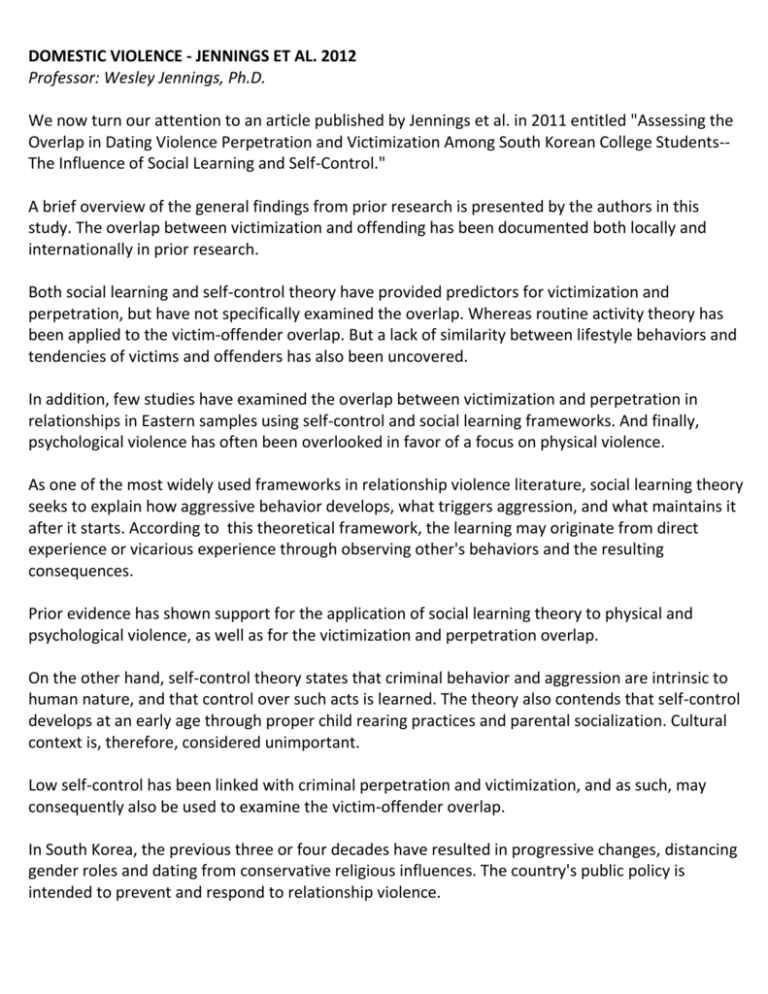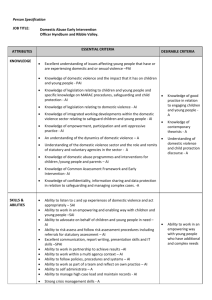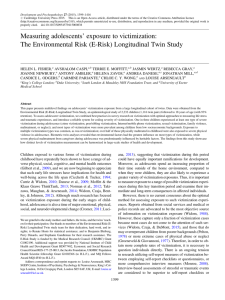ccj4681_jennings_transcript_jennings2
advertisement

DOMESTIC VIOLENCE - JENNINGS ET AL. 2012 Professor: Wesley Jennings, Ph.D. We now turn our attention to an article published by Jennings et al. in 2011 entitled "Assessing the Overlap in Dating Violence Perpetration and Victimization Among South Korean College Students-The Influence of Social Learning and Self-Control." A brief overview of the general findings from prior research is presented by the authors in this study. The overlap between victimization and offending has been documented both locally and internationally in prior research. Both social learning and self-control theory have provided predictors for victimization and perpetration, but have not specifically examined the overlap. Whereas routine activity theory has been applied to the victim-offender overlap. But a lack of similarity between lifestyle behaviors and tendencies of victims and offenders has also been uncovered. In addition, few studies have examined the overlap between victimization and perpetration in relationships in Eastern samples using self-control and social learning frameworks. And finally, psychological violence has often been overlooked in favor of a focus on physical violence. As one of the most widely used frameworks in relationship violence literature, social learning theory seeks to explain how aggressive behavior develops, what triggers aggression, and what maintains it after it starts. According to this theoretical framework, the learning may originate from direct experience or vicarious experience through observing other's behaviors and the resulting consequences. Prior evidence has shown support for the application of social learning theory to physical and psychological violence, as well as for the victimization and perpetration overlap. On the other hand, self-control theory states that criminal behavior and aggression are intrinsic to human nature, and that control over such acts is learned. The theory also contends that self-control develops at an early age through proper child rearing practices and parental socialization. Cultural context is, therefore, considered unimportant. Low self-control has been linked with criminal perpetration and victimization, and as such, may consequently also be used to examine the victim-offender overlap. In South Korea, the previous three or four decades have resulted in progressive changes, distancing gender roles and dating from conservative religious influences. The country's public policy is intended to prevent and respond to relationship violence. And in fact, in 1994, the South Korean Protection Act was passed. This act places a strong emphasis on family health and preservation. And domestic violence is addressed as a threat to the preservation of South Korean families. The current study offered an examination of the overlap between victimization and offending of physical and psychological relationship violence in the South Korean sample with a focus on selfcontrol and social learning variables. Data were collected through dating violence surveys comprised of 167 questions on demographics, dating violence experiences, stalking experiences, fear of crime, and other related topics. The final sample consisted of 1,399 South Korea college students in 2007. Psychological dating violence offending and victimization and physical violence offending and victimization were the dependent variables in the study. There were also a series of independent variables. The first of these was social learning theory. It was measured by whether respondents witnessed their fathers commit violence against their mothers and/or witness their mothers commit violence against their fathers. And also it measured the occurrence of childhood maltreatment by parent, guardian, or caretaker. Comparatively, the other main independent variable was self-control, which was measured using the 23 item scale from the Grasmick et al. Self-control scale. There were also additional variables in the model, particularly, being in an exclusive relationship and family structure, as well as sexual risk-taking, which was also a measure of low self-control. The results for psychological violence offending and victimization show that males, older individuals, those dating exclusively, those having experienced childhood physical abuse, sexual risk-takers, and those having low self-control are more likely to be involved in psychological dating violence offending and victimization. In fact, even after controlling for demographics, social learning and selfcontrol factors, there was still a strong and significant correlation between psychological dating violence offending and psychological dating violence victimization. The results for physical dating violence offending and victimization suggested that being male, those dating exclusively, those who experienced childhood physical abuse, sexual risk-takers, and those having low self-control are more likely to be involved in physical dating violence offending and victimization. Even after controlling for demographics, self-control factors, there was still a strong and significant correlation between physical dating violence offending and victimization. This was also observed above and beyond the effect of social learning factors. In the end, Jennings et al. found that the results were largely consistent with prior research, suggesting a considerable degree of overlap between offending and victimization, as well as with the US and international dating violence research that has previously examined the topic has uncovered these findings as well. Also, these findings offer support for the generalizability of the victim-offender overlap to South Korean college students. Varying levels of support were also found for the influence of social learning and self-control theories for predicting involvement in both psychological and physical dating violence perpetration and both psychological and physical dating violence victimization.










